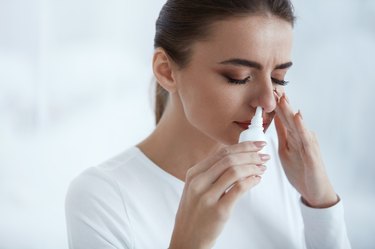
Clogged. Blocked. Stuffed up. However you describe it, nasal congestion is the pits. But it's also super common, with adults slogging through an average of two to three colds per year, each lasting about a week. And don't even get us started on allergy season.
There's still no cure for the common cold, but there are plenty of at-home hacks that can ease the stuffiness that comes with cold symptoms and help you breathe a little easier.
Video of the Day
Video of the Day
Here, Alan Workman, MD, a board-certified otolaryngologist with Mass Eye and Ear and assistant professor of otolaryngology–head and neck surgery at Harvard Medical School, breaks down the best nasal congestion home remedies along with what to avoid and when to see a doctor about your symptoms.
The Best Nasal Congestion Home Remedies
Over-the-counter decongestant meds are an option for un-stuffing your nose, but they aren't for everyone. These meds can increase your blood pressure and blood sugar, aggravate urinary conditions and glaucoma, increase your risk of seizure and affect heart conditions, per the Mayo Clinic. They can also mess with medications that help manage hypertension, epilepsy, diabetes, heart and thyroid conditions. Plus, they may come with side effects like insomnia or anxiety.
What's more, the FDA recently announced that decongestant medications containing phenylephrine (think: Sudafed PE) are ineffective.
Fortunately, Dr. Workman says the following drug-free nasal congestion home remedies can effectively soothe your symptoms.
1. Nasal Irrigation
Good Evidence"Saline (saltwater) irrigation with a NeilMed bottle, neti pot or other nasal irrigation device is by far my favorite home remedy for nasal congestion," he says. "My wife and I both use it when congested."
Essentially, nasal irrigation means giving your nose and sinus area a good rinse with sterile salt water.
"Not only does it help to thin mucus and decrease inflammation, it also washes away allergens and irritants," Dr. Workman says, making it a great remedy for nasal congestion caused by a cold, sinus infection or allergies.
You'll want to follow a few safety tips with these devices, though:
- Never use tap water, as it may contain bacteria or other microorganisms that could lead to serious infections. Opt instead for distilled, sterile or previously boiled water, per the Centers for Disease Control and Prevention (CDC).
- Follow the device's instructions carefully, and wash your hands before using it.
- Make sure to wash and dry the device after each use, per the FDA.
If you develop a fever, headache, confusion or vomiting after using a nasal irrigation device, see your health care provider right away, as these could be signs of an infection.
Try nasal irrigation using these products:
- NeilMed Sinus Rinse Kit ($11.48, Amazon)
- NeilMed NasaFlo Neti Pot ($14.99, Amazon)
2. Staying Hydrated
Good EvidenceOther than nasal irrigation, Dr. Workman says "the best strategy to combat congestion is to keep mucus thin," and staying well hydrated is an easy and effective way to do just that.
For the record, the National Institutes of Health (NIH) recommends drinking between 9 and 13 cups of fluids per day.
As for what to drink to relieve congestion, there's no cure-all beverage. Water and other low-calorie drinks like seltzer and plain coffee or tea are best, per the NIH. Milk or milk alternatives and vegetable juice are also good options, but limit or avoid sugary beverages like soda and sports drinks, which pack a lot of calories without added nutritional value.
Hot drinks like tea may be soothing if you also have a sore throat, Dr. Workman notes, but tea isn't necessarily better than water for managing congestion. Similarly, you may have heard that lemon water is helpful for congestion, but Dr. Workman says there's no evidence it works better than regular H2O. If the zingy taste encourages you to drink up, though, then go for it.
3. Steam Inhalation
Good EvidenceInhaling steam from heated water can warm and moisten your nasal passages, offering short-term relief from nasal congestion, Dr. Workman says.
One easy way to do this is by hanging out in a hot shower or bath. Keep the bathroom door closed so the warm, humid air stays inside, and breathe deeply as you bathe.
Another option is to fill a large bowl or pot with steaming water, drape a towel over your head and breathe in as you sit with your head over the bowl. Just make sure the water isn't so hot that the steam burns your face.
If you want a more portable option — say, to use at your desk — there's a gadget for that. Try a personal steam inhaler, such as Vicks Sinus Inhaler ($42.98, Amazon).
4. Running a Vaporizer or Humidifier
Good EvidenceBoth vaporizers and humidifiers add moisture to the air around you, which can help ease nasal congestion, Dr. Workman says. He especially recommends running these devices in your bedroom while you sleep during the colder months, when the air tends to be drier.
A humidifier turns cool water into a fine mist that's then released into the air. A vaporizer, on the other hand, boils the water and releases the steam. Both are effective in adding moisture to the air, but the Children's Hospital of Philadelphia (CHOP) recommends opting for a cool mist humidifier if you have kids because a vaporizer can cause burns if your child gets too close to the steam or accidentally knocks it over.
CHOP also recommends using filtered or distilled water in your humidifier and cleaning the device every two to three days. Empty and dry the tank in between uses, too, to prevent mold.
5. Menthol
Some Evidence"Similar to the way mint lozenges can make drinks taste 'cold,' inhaling menthol aromas can make your nose feel more open," Dr. Workman says.
That said, menthol products don't cause any changes in mucus or inflammation, so the effects are likely to be short-lived.
6. Spicy Foods
Some EvidenceIf you enjoy spicy flavors, consider this your go-ahead to kick things up a notch when you're congested.
Eating spicy food can cause a runny nose and thin out mucus, Dr. Workman says, making it a decent home remedy for nasal congestion. Though again, the effects won't last long after your meal.
What About Nasal Massage?
Limited EvidenceYou may have heard that nasal massage — aka, gently rubbing the area around your nose and sinuses — is a good home remedy for nasal congestion, but this one is iffy.
"It can help with relaxation, but there is not much data on whether it actually is relieving," Dr. Workman says.
So it's not a hard no. If it feels good to you, go for it. Just keep your expectations in check.
What Not to Do When You Have Nasal Congestion
The nasal decongestant Afrin (oxymetazoline) is very effective at relieving nasal congestion, but you should never use it for more than three days, Dr. Workman says.
"It is very easy for your body to get addicted to the decongestant effect and it loses effectiveness over time," he explains. "It also causes rebound congestion when not using it so you can end up more congested than ever before."
He tells his patients that Afrin is best used only for "emergencies," like if you have a big presentation and need to sound less congested quickly, or when you're flying and want to clear your sinuses for takeoff or landing.
"Other than this, the inhalation of harsh chemicals or irritants will also generally make things worse," he warns.
When to See a Doctor
Most cases of nasal congestion are best treated at home with the above strategies along with plenty of rest. But in certain cases, you may want to see your health care provider for treatment.
"If your congestion has been going on for a long time, it is helpful to see a doctor to discuss strategies and remedies for managing chronic rhinitis and/or chronic sinusitis," Dr. Workman says. In other words, if your symptoms come and go over a period of months or never seem to fully resolve, have a chat with your provider.
"For shorter periods of congestion, you should see a doctor if you have a significant fever, thick yellow/green discharge for longer than 10 days, severe facial pressure, neck stiffness or shortness of breath," Dr. Workman says.
- Centers for Disease Control and Prevention: "About Common Cold"
- Penn Medicine: "Common Cold: Symptoms and Causes"
- Mayo Clinic: "Mayo Clinic Q and A: Decongestants can sometimes cause more harm than good"
- Centers for Disease Control and Prevention: "About How to Safely Rinse Sinuses"
- FDA: "Is Rinsing Your Sinuses With Neti Pots Safe?"
- National Institutes of Health: "Hydrating for Health"
- Children's Hospital of Philadelphia: "Vaporizer or Humidifier: Which Is Best?"
Is this an emergency? If you are experiencing serious medical symptoms, please see the National Library of Medicine’s list of signs you need emergency medical attention or call 911.


